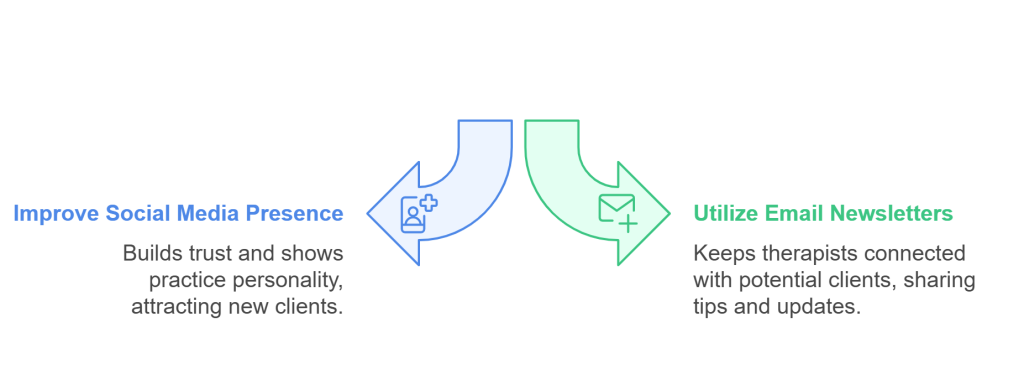As a digital marketing agency working with mental health professionals, we’ve seen firsthand how therapists and counsellors struggle to market their practices effectively. While you excel at helping clients, marketing your services requires a different skill set. Here are the most common marketing mistakes we see therapists make – and how to correct them.
Avoid these pitfalls in your marketing strategy:
- Overly Aggressive Sales Tactics
- Neglecting Client Privacy
- Inadequate and Inconsistent Branding
- Poor Website Design
- Poor Price Communication
- Focusing Solely on Marketing or Networking
- Marketing to Everyone
- Weak Social Media and Email Marketing
Growing a strong network of clients starts with understanding how to connect with clients online, as it can often be the first time they hear about you. By avoiding common mistakes, you can ensure a positive and productive partnership that emphasizes genuine care rather than sales tactics.
Aggressive Sales Tactics & Inauthentic Marketing
In marketing, we focus on avoiding pushy sales techniques that could manipulate or mislead potential clients. Instead, we emphasize a more meaningful approach that values education, credibility, and trust. We have seen many therapy practices appear manipulative – constant promotional emails, time-limited discounts, and aggressive follow-ups. This approach may work for some industries but not mental health services.
Mental health care needs trust and for clients to feel genuine care from providers. When you use high-pressure sales tactics, you risk damaging the therapeutic relationship before it even starts. Your clients want to feel understood and cared for, not sold to. Pushing an aggressive sales method contradicts your role as a therapist. As a mental health professional, you want to help people make the right decision, even if it means losing a potential client. There can be a disconnect that would cause potential clients to question your authenticity.
Choosing a therapist is a significant personal decision, unlike buying a notebook or choosing your favourite soap brand. People need more time to feel comfortable, and bookings may not convert on the first visit to your site. Sales pressure in this industry often pushes clients away rather than drawing them closer. This can also lead to bad word-of-mouth, making individuals share their negative experiences online and harming your reputation.
Disregard for Client Privacy
Have you heard of health professionals accidentally violating ethics guidelines by discussing inappropriate topics or when BetterHelp pushed people to release private information? This has sadly happened multiple times and creates serious problems.
Even unintended actions can seriously harm reputation or result in legal ramifications. Mental health services should prioritize client privacy due to the sensitivity of shared information. Therefore, therapists should focus on informed consent, clear privacy policies, and ethical marketing to maintain confidentiality. Transparency and adherence to British Columbia’s PIPEDA rules are essential to avoid penalties and preserve credibility.
Instead, keep marketing content general. Use themes and everyday situations rather than specific cases. Focus on your methods and expertise without revealing client information. This shows potential clients you take privacy seriously while showing them your educational background. It is good to discuss how you value security and confidentiality as the centre of your marketing strategy.
Inadequate & Inconsistent Branding
We recognize the importance of a strong branding strategy for therapists in today’s digital age. Often, we see therapy websites using mismatched logos, different colour schemes across platforms, and random design choices. This inconsistent branding creates client confusion and a weak professional image. Likewise, having an overly clinical messaging may confuse patients. You may understand terms like “cognitive behavioural therapy,” but clients often search for help using simple words. Write most of your marketing materials in everyday language while still showing your education in appropriate areas.
When your website looks professional, but your social media seems amateur, or vice versa, it makes clients question your reliability and potentially turn away from your services. Strong branding helps people remember you. With inconsistent visuals and messaging, clients struggle to recall your practice across different media channels. This reduces the impact of your marketing efforts. Clients need clear, consistent impressions to feel confident in their choice of a therapist. You don’t want to come across as disorganized or unprofessional.
To effectively guide clients toward well-being, our healthcare brand’s visual representation must resonate positively. Avoid images that suggest sadness or discomfort, instead opting for uplifting, healing imagery. For professional headshots, focus on trustworthiness and empathy. A well-chosen headshot can establish trust, and genuine expressions can encourage clients to seek support. To be effective in our mission, you must project a balanced, authentic, and present image in all aspects of your branding.

Poor Website Design
A simple website with contact details isn’t enough; your website should answer questions and make it simple to book sessions. But it should also be fast, avoiding confusing navigation, and outdated designs.
Lots of therapy websites have complicated booking systems. If someone needs to fill out lengthy forms or wait days for responses, they might give up. Consider using JaneApp, a straightforward booking system used by many practitioners.
Also, many people seeking therapy browse websites during difficult times. Poor contrast, tiny text, or complicated layouts create unnecessary stress and drive clients away. A well-designed website is oftentimes the first introduction a potential client has to you, so it takes time to develop a visually appealing, easy-to-use site.
Poor Price Communication
You might feel uncomfortable displaying your fees, but unclear pricing frustrates potential clients. Many therapists hide their rates or use vague terms like “sliding scale available.” Be clear about your fees, payment methods, and insurance policies on your website. This helps clients make informed decisions and saves time for both parties.
Focusing Solely on Marketing or Networking
Digital marketing is increasingly important, but ignoring professional relationships can reduce valuable referral sources. Many clients find therapists and counsellors through doctor recommendations, support groups, and online reviews. Ignoring networking mistakes limits your opportunities as a therapist. Building relationships and diverse connections is crucial for growth and success. Partnering with other professionals and schools can bring in referrals and connections. Collaboration with integrity fosters trust, allowing you to offer comprehensive care.
And only networking can limit your potential reach. Many clients start their search for mental health resources online, and without appropriate digital marketing, they won’t find you. You can miss out on finding clients who prefer research therapy options privately. Developing an SEO strategy is crucial to marketing yourself online so you appear on search engines effectively.

Marketing to Everyone
“I can help anyone” doesn’t help you stand out. While you can treat various conditions, successful therapy practices focus on specific groups – like couples with fertility issues, busy professionals with stress, or teenagers with anxiety. This helps you create clear, focused marketing messages.
Weak Social Media and Email Marketing
Many therapists collect email addresses but never use them. A simple email newsletter keeps you connected with potential clients who aren’t ready to book yet. Share mental health tips, practice updates, and valuable resources. This helps build trust over time.

Frequently Asked Questions
How Can I Ensure My Marketing Aligns With My Therapeutic Values?
To ensure your marketing aligns with your therapeutic values, we focus on transparency, clarity, and ethics, valuing every client across your website. Do this by showing empathy and promoting informed, inclusive, uplifting, clear, and easy-to-understand content. Communicate effectively, connecting clients with suitable solutions, giving utmost respect to diversity, uplifting individuals, and prioritizing genuine fits. You can create trust by aligning and harmonizing your marketing efforts with these values.
What Online Resources and Strategies Are Most Effective for Counsellors Without a Strong Digital Presence?
For counsellors starting online without prior presence, we suggest approaching this like a first conversation. Think of a well-maintained website as your first impression – it should showcase your professionalism and unique approach. Search Engine Optimization (SEO) is like creating a clear, well-defined message that suits your target audience. You can keep the digital conversation going by providing regular and valuable content updates, making your presence lively and engaging.

